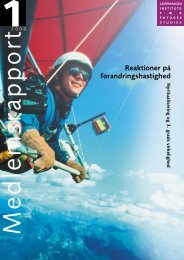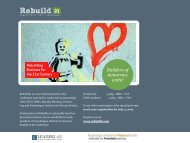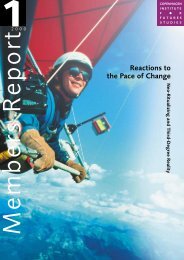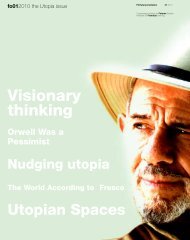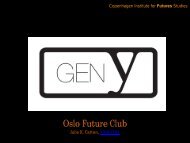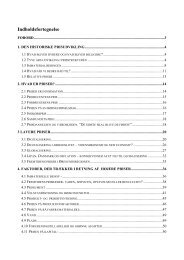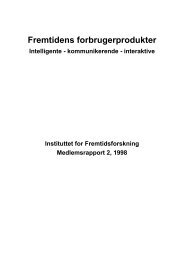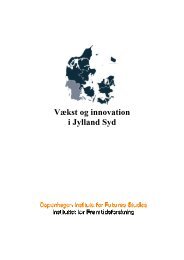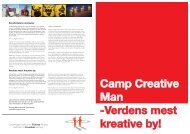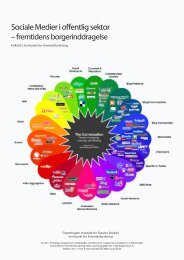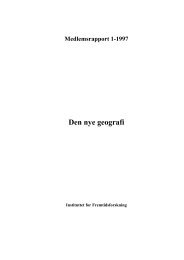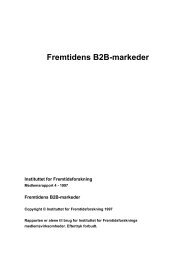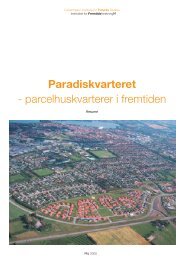Branding.
Branding.
Branding.
You also want an ePaper? Increase the reach of your titles
YUMPU automatically turns print PDFs into web optimized ePapers that Google loves.
20<br />
nating community is necessary.<br />
We are met by rapid changes on the technological and commercial fronts.<br />
It seems odd and frightening that plastic cards and keys in most places have<br />
been replaced by handprint and voice recognition. And that the passport control<br />
at the airport is done biometrically through fingerprint reading. Intelligent<br />
systems are practical, but the consequences are hard to predict. Are we moving<br />
towards a surveillance society? How should we feel about the developments?<br />
That we also have to consider all sorts of other matters don't make things better.<br />
Is it environmentally responsible to deposit waste in the earth's crust?<br />
Should we use cloning techniques to help the last group of childless couples?<br />
Are the new 100% safe nuclear power plants really 100% safe?<br />
The typical reaction on the individual level is to seek comfort and fixed<br />
points of reference in the near things and in communities. However, the<br />
classic distinction between 'collectivism' and 'individualism' hasn't been<br />
reintroduced - far from it. For centuries the societal evolution has had as its<br />
goal to liberate us from destined communities. For this reason the individual<br />
things today are the common and the social. We are alike because we all are<br />
liberated. Individualism isn't a choice, but a fate for modern man.<br />
Thus, society today is in the process of changing from one type of individualisation<br />
to another. Today individualisation isn't a goal in itself; it is<br />
the means for participating in the societal process. The goal today is hence<br />
very much to create new communities and references between people.<br />
The public service stations on TV and radio still thrive even though all<br />
now are broadcast digitally and compete with all the world's pay-per-view stations<br />
on the internet. The world would seem totally fragmented if the daily<br />
news broadcasts, youth serials and other popular fiction shows didn't select<br />
and interpret events and situations for us. The formation of experience is<br />
based on the logic of cause and effect, which is communicated and experienced<br />
through narratives about the world and the individual's place in it. For<br />
this reason companies still focus on corporate branding and storytelling.<br />
If we were to single out two types of people, they would on the one<br />
hand be 'the true brand believer' - and on the other hand the NGO, 'the true<br />
anti-brand believer'. It is a case of Logo or No Logo. The battle lines are<br />
drawn sharper than before, but both types bear witness to a need for being<br />
part of a greater whole. In the last decade, the NGO organisations have more<br />
than doubled their number worldwide. It is a matter of 'them' and 'us'.<br />
Anchoring is crucial, not just on the interpersonal level. We try very<br />
much to draw nature and the surrounding society into a holistic whole.<br />
Hence, state-controlled organic farming, nutritionally correct weekly packages<br />
of fruit and vegetables, co-operatives and new organic collectives still<br />
increasingly become a fact of life, just as regional products are valued highly.<br />
BIOMETRICS is the measurement<br />
of biological patterns. The bestknown<br />
example is fingerprinting,<br />
but a number of the body's patterns<br />
can function as unique keys.<br />
Some examples are face, iris and<br />
hand. In the years leading to 2013,<br />
biometrics will be a phenomenon<br />
we all are going to get acquainted<br />
with, e.g. fingerprints used as<br />
passwords to computers. The<br />
technology has in many cases<br />
been developed enough to be<br />
easily implemented. In some places<br />
biometrics has already become<br />
a part of everyday life. In the<br />
London suburb of Newham, 200<br />
cameras have e.g. been mounted<br />
and connected to computers that<br />
through special software can<br />
recognise faces. Read more on<br />
www.identix.com<br />
THE DREAM GOES ON<br />
THE CORE STORY<br />
Family chronicles and multi-generation communities<br />
Individualisation has liberated us, and the movement is now followed by an<br />
opposing trend, a focus on community and togetherness. Family and community<br />
are increasingly given equal status with the individual's personal<br />
interests - or rather, the personal interests are defined as founded in the<br />
community's consistent and coherent past-present-future constellation.<br />
In many ways the family will come to reflect the idea of corporate branding<br />
- and vice versa. Just as storytelling becomes more founded in companies,<br />
the family chronicle increasingly functions as 'family branding'. The<br />
family thus resembles the monolithic brand, which is characterised by its<br />
internal and external cohesiveness, homogeneity and strength (see page 6).<br />
The multi-generation community is one of the models of living arrangements<br />
that have won a lot of terrain since the turn of the millennium. It<br />
makes it possible to draw on all the help and togetherness offered by an<br />
The relationship between brand<br />
story and man: The ‘core story’ is<br />
the ideal. The big story about the<br />
company and the world, which<br />
also contains a little story about<br />
the individual’s place in the big<br />
picture



